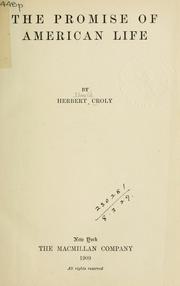The Promise of American Life facts for kids
 |
|
| Author | Herbert David Croly |
|---|---|
| Country | United States |
| Language | English |
|
Publication date
|
1909 |
The Promise of American Life is an important book written by Herbert Croly in 1909. Croly was also the founder of The New Republic magazine. In this book, he suggested ideas about how America could become a better country. He believed in careful economic planning to improve life for everyone. He also thought that labor unions should not be too aggressive.
Even though only about 7,500 copies were sold by 1930, the book had a huge impact. It inspired President Theodore Roosevelt to create his "New Nationalism" plan. Many thinkers and political leaders during the later New Deal era also found the book very helpful.
Contents
What Was the Book About?
This book is seen as a guide for the Progressive movement in America. It talked about how the country was changing from a time of small businesses to a time of large companies. It also discussed how the government's role was growing to help its citizens.
Croly believed that the old idea of America, where everyone was totally free and independent, was gone. This old idea came from a time when most people lived on farms. But the country had changed a lot with new factories, big cities, and more organized ways of doing things.
He wanted a new way of thinking about politics. This new way would focus on the whole nation, but also care for people who were not as lucky. Since big businesses and powerful groups had changed the country, Croly felt the government needed to become stronger. This would balance out the power of these large groups. He pushed for the federal government to have more power. This was to make sure that democracy, or rule by the people, would continue. He called this idea the "New Nationalism."
Croly thought that too much focus on individual freedom had led to an unfair way of sharing wealth. He argued that the national government should be more powerful. This stronger government would protect against selfishness, greed, and unchecked power. At the same time, Croly valued people who wanted to help their community. He encouraged everyone to be a "constructive individual" and work for the good of all.
Balancing Old Ideas with New Needs
According to David Kennedy, a historian, Croly suggested a new way of thinking about democracy. This new idea focused on what was good for society, not just for individuals. It talked more about social control than about complete freedom.
Croly called this "Hamiltonian means." This meant setting up federal groups with experts to watch over big companies. Croly accepted and even welcomed these large businesses. He believed that the old idea of individualism, linked to Thomas Jefferson, was not useful anymore. He thought bringing it back would stop America from becoming a better democracy during the Progressive Era.
Croly then suggested that "Hamiltonian means must be used to reach Jeffersonian ends." This means using strong government actions (like Alexander Hamilton believed) to achieve the goals of individual freedom and happiness (like Thomas Jefferson believed). For Croly, this meant that to fulfill America's promise, there needed to be some rules and discipline. It was not just about everyone getting what they wanted. It also meant people needed to work together and sometimes put the group's needs first.
What People Thought: Good Reviews
After reading The Promise of American Life, former President Theodore Roosevelt was very impressed. He wrote:
Mr. Herbert Croly's "Promise of American Life" is a very deep and clear study of our country's situation. It strongly says that our government's main goal is to truly achieve democracy. This means democracy in politics and in how businesses work.
What People Thought: Not-So-Good Reviews
The Promise of American Life also received some criticism. Some people worried that Croly's ideas sounded like they could lead to a government with too much control. Others were concerned that his plan would make America socialist. Croly had thought about this criticism in his book. He tried to explain that his government was nationalistic, not socialistic.
Even people who thought Croly's government could be democratic had concerns. They felt his view of the country might be unfair because he seemed to favor Republicans. His book criticized Democrats several times but hardly ever criticized Republicans.
Croly's book was also criticized for not focusing enough on the whole country. It mostly talked about problems that mattered to people living in cities. It barely mentioned issues important to people in rural areas. Things like taxes on imports, protecting nature, money, banks, and farming were only briefly touched upon. Some also argued that Croly's plans were not realistic. They felt his ideas were disconnected from the real lives of many Americans.
 | William Lucy |
 | Charles Hayes |
 | Cleveland Robinson |

